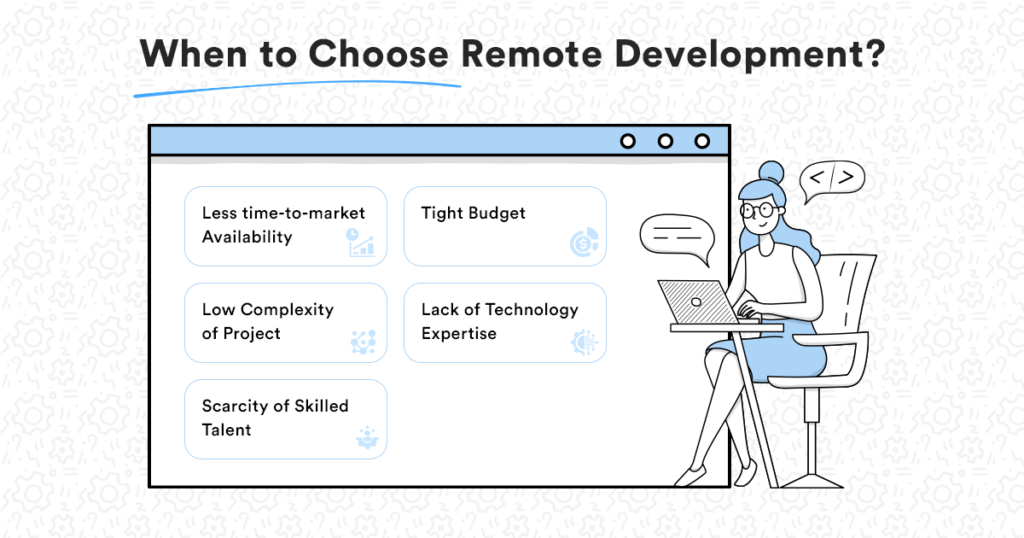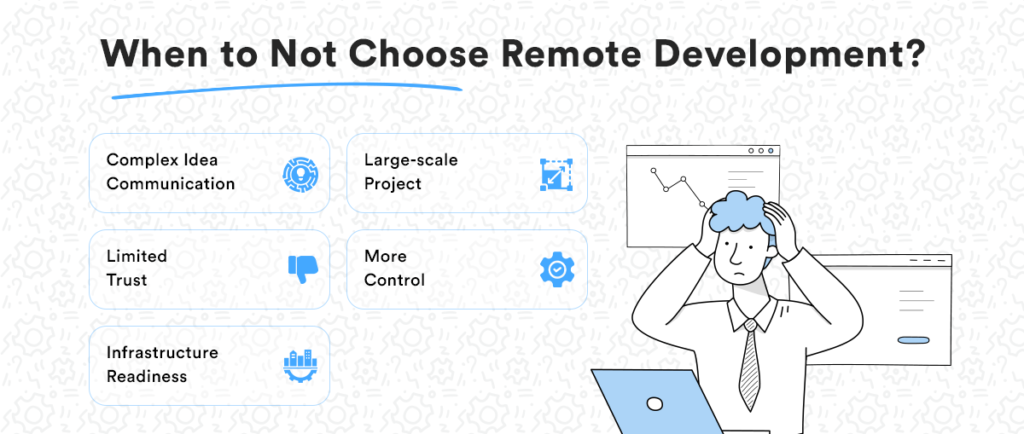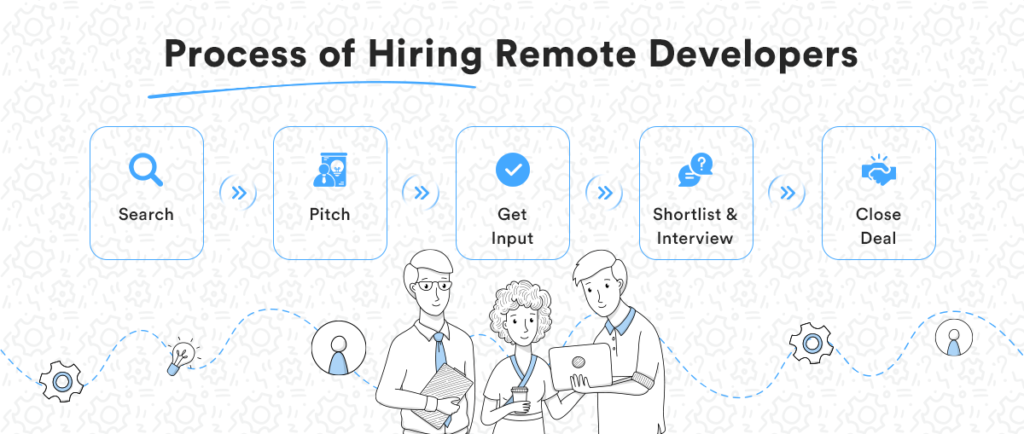![When and How Remote Development is the Best Choice for Digital Start-ups? [Complete Information]](https://www.techwebspace.com/wp-content/uploads/2021/10/virtual-calling-campaign-795x385.jpg)
“Should I hire an in-house development team or appoint remote developers for my project?” This is one question that most startup founders struggle with after ideating a digital product or a concept. We’ll cut to the chase and let you know that there’s no ‘one solution fits all’ type of answer to this question. The choice entirely depends upon your project and your requirements.
However, in most cases, the latter option (i.e., hiring remote developers) is the ideal one. With as many as 70% of startups preferring remote development for their digitalization idea, it is only natural to wonder whether or not this option will be suitable for your requirements as well. If you have similar questions in mind, look no further than this blog.
Here we will thoroughly discuss the situations and factors that make remote development a great business idea; and cases where this approach is not so suitable. Let’s start the blog by understanding more about remote development.
What is Remote Development?
Remote development, also commonly known as outsourcing development, is the approach to building a digital product by outsourcing your IT service requirements to an external developer/ team of developers. The global market for IT outsourcing is forecasted to reach USD 1065.10 billion by the end of 2030, proving the concept’s exquisite demand among business founders.
Here, your digital product is developed outside your organization by either a freelancer or an IT company specializing in design and development-related services. It is important to note that the latter option is widely preferred by businesses as hiring freelance developers comes with numerous challenges and hurdles, making it a not-so-preferable mode of outsourcing. For this reason, we will be focusing on the ‘outsourcing to an agency’ approach in this blog.
You must know that outsourcing is in contrast to the more commonly known ‘in-house development’ approach, where businesses hire a complete team of business analysts, designers, developers, and QA testers to work on the project. Both of their approaches have their own advantages, drawbacks, and implementations.
Today, businesses hire remote developers to outsource website development, mobile app development, software development, and other IT-related services like upgradation, maintenance, migration, etc. This trend especially became popular in 2020, when more and more businesses realized the potential and scope of remote work and, consequently, remote development.
However, regardless of the tremendous advantages that outsourcing development offers to businesses, let us tell you that this option might or might not be the best match for your requirements. Moving further, we will take a look at different situations where it is a good idea for businesses to hire remote developers for their projects and cases when this option is not so perfect for your IT requirements.
Make sure to read carefully, as by understanding these factors, you will be able to determine why and why not outsourcing development can be a great option for your business.
When is Remote Development Ideal?

Less Time-to-market Availability
Time to market is the duration between the product’s ideation and actual launch. Generally speaking, this duration is what comprises the software development life cycle. The time that your product’s development will take will depend on numerous factors, such as:
- Team size
- Number of features
- Technologies
- Product’s complexity
In an unfavorable scenario, these factors will directly add to your product’s time to market and will delay its launch. For many businesses, this is not a feasible option as, for them, a higher time to market is directly equivalent to increased cost of development and delayed launch.
However, by outsourcing your IT requirements, you can easily ensure that your product is developed within a minimum time frame. This is because IT service companies offering remote development services integrate numerous models into your project to speed up its development process.
Therefore, if you want to reduce your product’s time to market and boost its launch, outsourcing your IT requirements and hiring remote developers for your project is the best choice.
Tight Budget
It is a commonly known fact that most startup businesses struggle with capital investment and funding. In this case, it is challenging and often impractical for businesses to invest additionally in digitalization and build a digital product.
Owing to this factor, many startup businesses abandon the idea of digitalization altogether and stick to traditional business approaches. However, let us tell you outsourcing makes it possible for businesses to get a world-class digital product at a relatively lower cost.
When you decide to outsource your IT requirements, you can hire developers from anywhere in the world. This includes hiring developers from Asian and African countries, where software development rates can be as low as $15/hr and $20/hr, respectively.
This can help businesses optimize the overall cost of their project and get a digital product without burning a hole in their pocket. This factor is often missing in in-house development, where development costs go sky-high for businesses based in countries with high software development rates.
Low Complexity of Project
Whether to hire remote developers for your project or hire an in-house development team is a decision that is tremendously influenced by the overall complexity of your project. Generally speaking, outsourcing development is ideal for products with low to moderate complexity and, in some cases, even high complexity.
This is because these products do not require the constant involvement of a development team. The only time you will need a developer’s assistance will be when you want to add new features, eliminate bugs, or migrate your platform. IT service outsourcing agencies offer most of these services as a part of their post-sales support.
Therefore, if you are planning to build a simple website for your company, an eCommerce application, or any other digital product of relatively low complexity, outsourcing your IT requirements is an ideal option in most cases. Moreover, in case you want to upscale your platform to a higher complexity, you can always hire an in-house development team later. This way, you can get assurance on your market ideas without spending an enormous amount of capital that otherwise goes for in-house development.
Lack of Technology Expertise
It is commonly known that developing a digital product is not a cakewalk process and requires extensive technological expertise. As a result, if you are planning to build a digital product for your startup, you should be thoroughly aware of numerous aspects of digital technology, like programming languages, database technologies, cloud technologies, third-party APIs, etc.
Moreover, one must also be aware of the latest technology trends and development practices. This will help you make the best decisions for your project and build a high-end product. In case you are not familiar with the technical aspect of product development, you will need to hire a technical expert for your project.
Alternatively, you can outsource your IT requirements to an agency. Here, an experienced IT service company takes care of your project and makes all the tech-related decisions. These agencies hold immense experience in the tech sector and are, therefore, capable of making adequate decisions for your digital product.
Scarcity of Skilled Talent
In order to build a high-quality digital product for your startup, it is essential to have a skilled development team for the project. This includes hiring experienced personnel for the non-technical (market research, feature planning) as well as technical (UI/UX design, programming, QA engineering, and launch) stages of the software development life cycle.
However, businesses find it challenging to source skilled and experienced talent for their project. In this case, most startups settle for an inexperienced development team which often results in the development of a low-quality product. Naturally, such products are not only of substandard quality but also have high chances of market failure.
Therefore, if you are struggling to find adequately skilled human resources to work on your project, it is in your best interest to outsource your IT requirements to an agency. Today, most IT agencies hire skilled and experienced personnel to work on their client’s projects. This ensures that your product is developed by experts and, therefore, is of superior quality.
These were some of the most common cases in which businesses should opt for remote development over in-house development. Moving further, we will take a look at cases when hiring a remote development team isn’t an ideal option for businesses.
When is Remote Development Unideal?

Complex Idea Communication
The key to creating a high-quality digital product is practicing clear and transparent communication throughout the development lifecycle. It is essential for business analysts, UI/UX designers, programmers, and QA engineers to be on the same page at all times for optimal results.
The better communication you have with the development team, the easier it will be to complete the project. Generally speaking, communicating ideas and requirements is easier with an in-house team as compared to a remote development team. This is because the in-house team is constantly available and easily accessible on your office’s premises, a factor that remote development teams lag in.
Therefore, if your project requires complex idea communication and frequent changes, outsourcing might not be the best option for you. This is because setting up a meeting with the development team and explaining your exact requirements to the developers can often be challenging with remote development.
In contrast to this, in-house teams are available at most times for a meeting and can easily be contacted. This makes in-house development an easier and more practical approach for such businesses.
Large-scale Project
The present-day remote development teams and development outsourcing agencies are capable of offering world-class solutions for projects of every scale and size. However, if you are planning to build an enormous platform like Amazon, remote development might not be the best option for you.
This is because developing such large-scale products requires dedicated development teams to work not only on developing the platform but also on post-launch maintenance. Enterprises like Amazon and Microsoft hire development teams that constantly work on the platform.
Therefore, if you are planning to build a large-scale product, it is the best idea to hire an in-house development team to work on the project.
Limited Trust
Trusting the development team is important when planning to build a digital product. Businesses that fail to understand this factor often suffer from a poorly conducted development process. This directly impacts the end quality of digital products and leads to business losses.
Therefore, one must determine whether or not they will be able to trust an external development partner before choosing whether to go with in-house development or choose the outsourcing approach.
This is one of the major reasons why many businesses refrain from outsourcing their IT requirements and stick to in-house development. Most businesses do not trust remote developers and find the remote development model to be unsuitable to their requirements. This makes development outsourcing an unfit option for digital product development and leaves startups with no choice but to hire in-house developers.
More Control
Many businesses prefer to exercise control over their development project and oversee every stage of the software development life cycle. However, it is commonly understood that exercising this control over the development process is not possible with remote development.
This is mainly because these IT service agencies have a project manager to oversee the project on the business’s behalf and as an intermediary between the business owner and the development team. Many business owners do not prefer this approach and want to oversee the project by themself.
This is one factor where remote development is unideal for your business. You can rather hire an in-house team and exercise complete control over your project. This will help you take charge of the development process and will enable you to mold it as per your requirements. However, let us tell you that if you are planning to manage your project on your own, you must be thoroughly aware of the latest technologies and tech trends.
Infrastructure Readiness
Designing and developing a digital product includes high infrastructure requirements. To explain, a business needs to provide numerous facilities to the development team to work efficiently on the project. Remote development is the best option for businesses that are not willing to invest additionally in infrastructure.
This is because infrastructure simply adds up to the total cost of the project and often makes the idea of digitalization economically unfeasible. However, if you have an infrastructure ready in your organization, you can safely go with in-house development.
This is usually the case with businesses that are not short of capital and receive ample funding from investors. Here, businesses can spend additionally without hesitation and provide world-class facilities to the development team and benefit from in-house development.
We hope that by now, you would have determined whether or not you want to go with the remote development approach. If you are sure that remote development is the best option for your startup’s digitalization objective, keep on reading as in the following section, we have provided a step-by-step process to hire an IT service outsourcing agency for your project.
How to Find Remote Developers?

Search
Here, you have to search for IT service agencies to work on your project. You can do this by utilizing IT company listing platforms like Clutch and GoodFirms and finding development agencies based in the location of your choice. You can fire search queries that are relevant to your requirements on search engines (like Google and Bing).
Pitch
Once you have prepared a list of all the development agencies offering the services you are looking for, you can connect with them and send them your requirements. This will enable the agencies to understand your project and determine the development roadmap.
Get Input
Once the agencies have understood your requirements, they will provide you with their input on the ideas. This often includes new features, monetization strategies, innovative concepts, and, most importantly, development cost and timeline.
Shortlist & Interview
This step involves shortlisting the agencies based on the inputs received in the previous step. Most businesses use development cost and timeline as the primary criteria for this purpose. Once shortlisted, you can go ahead and interview the selected companies and negotiate the deal.
Close Deal
After interviewing a few companies, you have to make the decision upon the choice of a development partner and close the deal with them. This step also includes negotiating the terms of the agreement and signing the contract with the development partner. Once the deal is closed, the development team will start working on the project.
The Bottom Line
Remote development is one of the most popular approaches among businesses planning digitalization. This is especially the case with startup businesses, as developing a digital product remotely comes with numerous benefits.
However, let us tell you that remote development is not ideal for all businesses and might not be the best choice for your project. All of this depends upon your project’s requirements and your business objectives.
We hope that by reading this blog, you have been able to determine whether or not to go with this option and how exactly you can adopt this approach if you decide to do so. By adhering to the approaches and following the process given in the blog, you are likely to build a world-class digital product for your business and benefit from your investment in digitalization.

